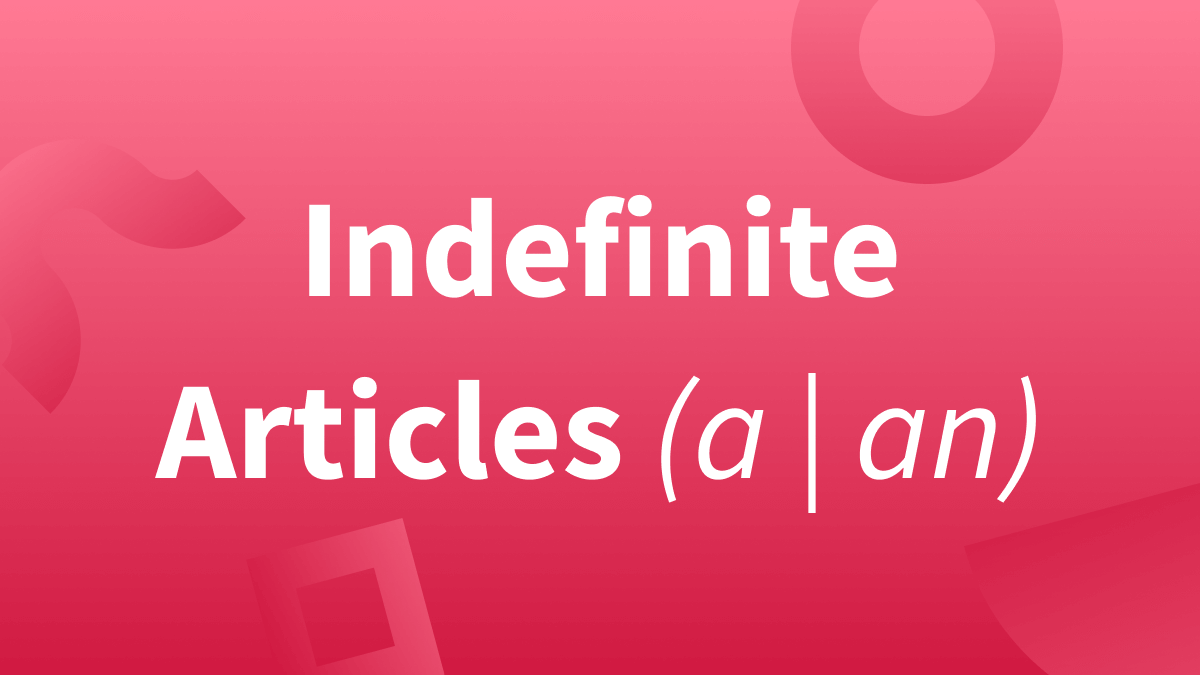Correct Use
- “A” and “an” are indefinite articles.
- They cannot be used for plural nouns.
- The general rule is that “a” is used in front of consonants, and “an” is used in front of vowels, but there are exceptions.
What Articles Does the English Language Have?
Every so often, the most basic words cause the most trouble in languages. Simply put, there is one definite article (the), and one indefinite article (a). But why is there another option for the latter? We explain the origins of the determiner “an,” and prove that pronunciation is more important for the evolution of a language than you might have thought.
What Is an Indefinite Article?
An article is a part of speech that usually accompanies nouns. It cannot stand alone and is divided into two distinct categories: the definite article “the” and the indefinite ones, “a” and “an.” By the way, together with certain pronouns they are referred to as the group of determiners.
A man was sitting at the bus station. It was a dark and cold night, but he was not wearing any clothes. The secret about him was not visible to the few people walking by…
Articles are some of the most frequent words in the English language—something that you can recognize within this very blog article itself.
Use “the” if what you are referring to is definite (i.e., if it has been mentioned before or is generally known).
Use “a” or “an” when it is not obvious, or not relevant, what exactly you are referring to.
Louis XIV was a king of France in the 17th Century.
Louis XVI was the king with the longest reign in history (over 72 years).
Please note, that the also serves as a plural article, whereas “a” and “an” cannot be used for plural nouns. Here, you simply don’t use any articles, or you stick to another type of determiner:
Can you speak to the kids about this?
The women in the indigenous groups are finally speaking up.
I prefer [Ø] apples to [Ø] bananas.
I have written many e-mails to you.
Do you have any other questions?
Note: The symbol [Ø] is used in linguistics and describes a gap. By using it, you can show that something could be at this position, but isn’t due to language singularities.
It’s also important to know that only countable nouns can appear with an indefinite article.
It was helpful to get an information.
✔ It was helpful to get the information | … to get information.
Differentiating “A” and “An” as Indefinite Articles
If you are certain about using an indefinite (and singular) article, you only need to distinguish between the two existing forms, “a” and “an.” This distinction is not a grammatical one, but rather traces back to phonetics (pronunciation).
The basic rule is:
“a” in front of a consonant, “an” in front of a vowel (i.e., a, e, i, o, u).
This is valid for the majority of words. It’s just easier to connect two consecutive vowels if you put an “n” in between. Furthermore, this distinction is noticeable in oral speech. The definite article the is spoken /ðə/ (roughly the same vowel sound as then). But it becomes /ði/ (with the same vowel as in these).
| Exam-ples | Using “a” as the indefinite article | Using “an” as the indefinite article |
|---|---|---|
| Nouns | pair, plant, ship, cat, ghost, pseudonym, school, king, state, feeling, mind, child, etc. | airplane, oath, article, itch, angel, imagination, eagle, etc. |
| Adj. | great price, long distance, high status, etc. | eerie silence, early start, indefinite article, etc. |
It doesn’t matter if the following word is an adjective or a noun: Use “an” always in front of a vowel.
A definite article | an indefinite article (also: an article)
Unfortunately, there are exceptions to this rule. As the letters don’t necessarily correspond to identical sounds in each context, look out for distinct representations:
- Silent “h” at the beginning.
- The letters “u,” or “eu” sometimes represent the sound “yoo” at the beginning of a word.
- Moreover, words like one don’t start with a vowel phonetically, but with an invisible “w.”
An hour, an heir, an honest person, an honor |
But: a house, a humble person, a hint, etc.
A unique solution, a U-boat, a universe, a university |
But: an unclear situation, an umbrella, etc.
Tip:
If you want to know which indefinite article you should use for single numbers, or special characters, just focus on their pronunciations.
- A: 2, 3, 10, t, k, g, q, - (minus), + (plus), ? (question mark), etc.
- An: 8, 11, 853, f, e, n, (all vowels), * (asterisk), etc.
How the Determiner “An” Has Left Its Traces
Due to this distinction between “a” and “an,” there have been some etymological changes, too. Have you ever wondered why Spanish calls an orange “una naranja”—so starting with the letter “n,” as its Arabic origin “nārandsch” ( نارنج)?
English used to call it “a norange.” But over time, people misinterpreted the unit as an orange. The same phenomenon happened with these words.
| Word in Modern English | Original form |
|---|---|
| An apron | a “naperon” (Old French/ Latin, like napkin) |
| An adder | a “nadder” (Proto-Germanic) |
| An oak | a “noke” (Old Norse) |
Funnily enough, the opposite development occurred as well.
| Word in Modern English | Original form |
|---|---|
| A notch | an “otch” (Middle English) |
| A newt | an “ewt” (Middle English) |
| A nickname | an “eke name” (Old English) → “eke”: to lengthen |
LanguageTool is definitely helpful when using articles in general. Furthermore, it differentiates between “a” and “an,” and always knows which nouns are countable to help you pick the right determiner. LanguageTool is a helpful free tool, an intelligent writing assistant, and the best choice for stylistically good texts.

